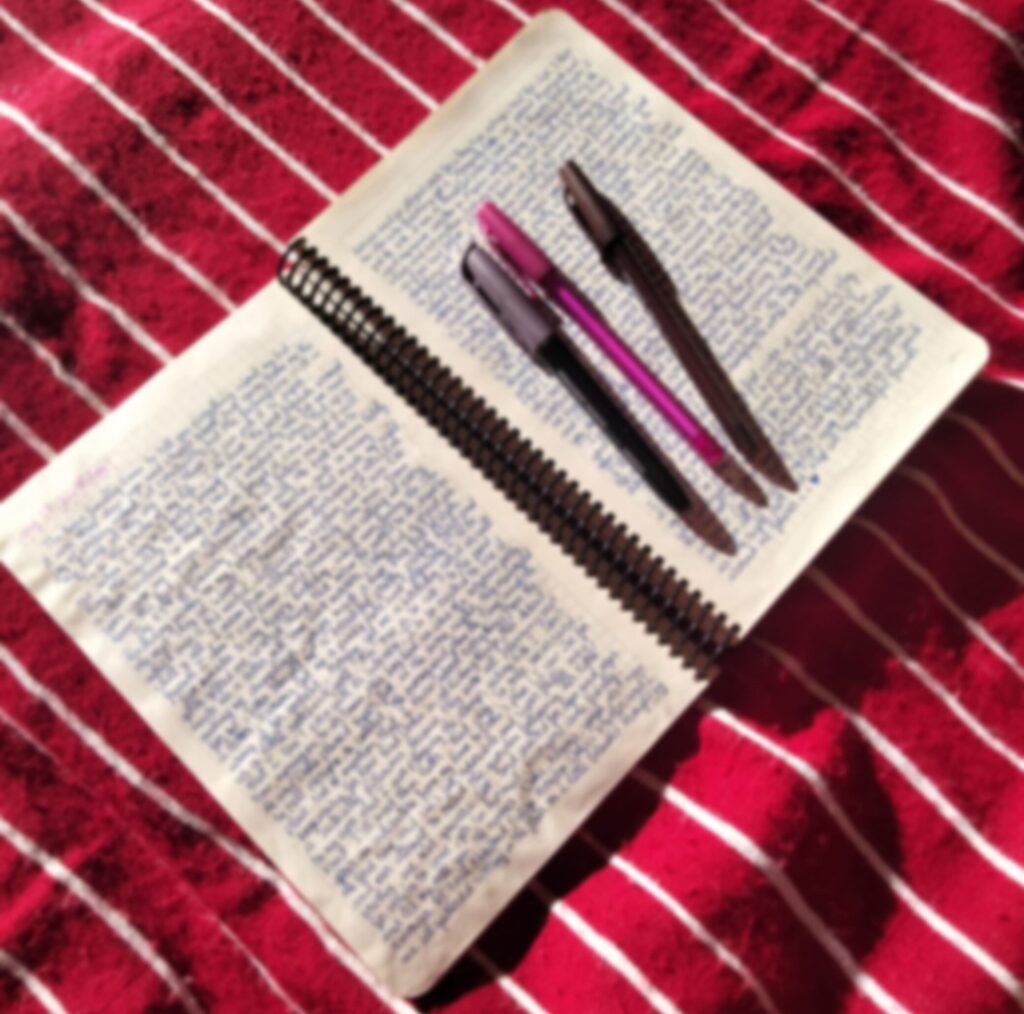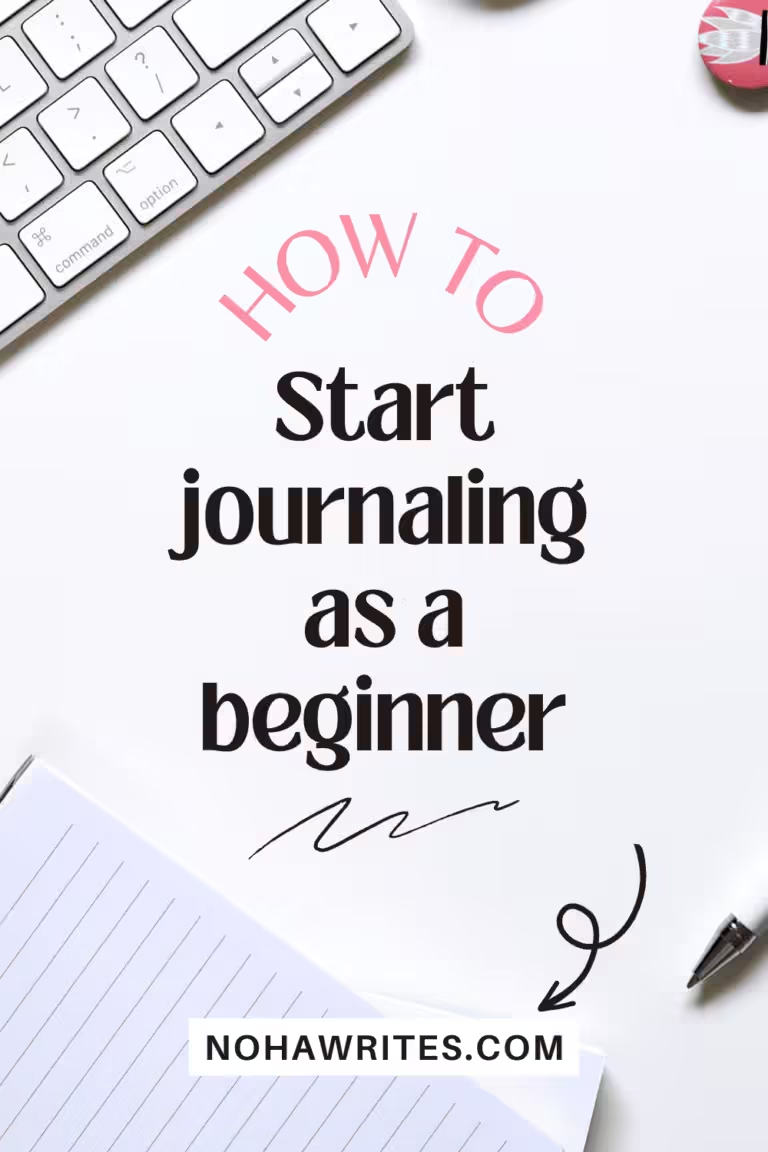It is more common lately to pick up journaling as a self-care tool. People are happily spreading the powers of this habit. So after hearing about all the good benefits, maybe you start thinking about how to start a journal. Yet you don’t know where to start yet.
I get it. When I first started journaling, I didn’t know exactly what I was doing either. But with time comes experience. I’ve been into journaling for almost 8 years now and I’m speaking from my own story.
For you to start your journaling journey you may need a little guidance! So here is an in-depth guide for journaling that will surely make things easy for you.
Disclosure: This post contains affiliate links. This means I may earn a small commission at no extra cost to you.
1- Choose the right notebook for your journaling
Unpopular opinion: any notebook can be a journal.
Just get a simple notebook. What’s essential is being comfortable with this new journal. Make it feel like home, like a cozy safe place.
You can choose from lined journals, dot grid journals, or even blank pages if you wish.
A crazier option would be to make your own! Works perfect if you are into DIY and hand-made crafts.
For instance, I always check this first! I make sure that the pages, the lines, and the colors match my vibes so that I can trust this journal and hold it close to my heart.

For Archer & Olive journals, use my code nohawrites for 15% off
2- Define your journaling goals: your "why"
Start by defining what you want to accomplish with this journal, it will help you organize your mind and skip the confusion. Here are some examples for inspiration:
In this journal, I want to:
- Write down my memories and important events
- Reflect on my life and learn from my mistakes
- Be more productive, less stressed, and more focused
- Track my habits and plan my days
- Write about my feelings and reduce my overthinking
Doing this will help you recognize your ‘why’ in the first place. Therefore, you will be clear and honest with yourself. Not to mention that with every new project, you ought to set a goal for it, a ‘why’ to keep you going and always remind you of the purpose.
3- Feel free when you write and let it flow
The only rule that you need to satisfy in a journal is to be free. Your journal should not be affected by any opinion. Besides, it is supposed to be private and you only share it when you want.

Freedom is a crucial concept here. Getting to know yourself and digging deep into your thoughts requires a sense of honesty. And an accessible writing style.
It’s also a personal experience that is dedicated to you only. So it would be best if you do not experience any fear or hesitation while writing because you do it for your pleasure and benefit. This helps you maintain a good connection with your writing, and satisfy your journaling needs smoothly.
4- Start writing: explore different styles and prompts
Now that you know the rules and have the right space set up, all you have to do next is start writing.
But you’re probably asking WHAT DO I WRITE ABOUT?
Simple! There are many entries to help you start, and the topics are limitless. Just like in this article: 20 inspiring ideas to write about in your journal.
And over all, you can start by talking about your day, telling a story, or explaining something that happened to you. Moreover, you can use it as a coping mechanism if you have anxiety or anger issues by releasing heavy emotions into it.
Writing everything you feel on paper helps you get rid of the chaos in your mind. As if you put away those emotions.

It is known that successful people begin their days by filling up pages with random emotions that they find floating in their minds. Furthermore, it’s a mental clarity activity to set the right mood before a long day. Just to make sure the day is distraction-free.
5- Use your creativity to create aesthetic pages

From my instagram: @noha.posts!
Until now, we have been discussing forms of “writing” in a journal. Writing is just one type of journaling. Next to it comes art, calligraphy, poetry, sketches, and collage. Remember the goal is to express yourself, so if you enjoy any kind of art feel free to include it too.
The world of stationery for artistic journaling is endless. You can always explore new calliograph pens, washi tapes, and more…
I personally love poetic paragraphs and artistic pages the most. They make me feel wonderful and give me more space to express my feelings. And to help you with that, you can make pages about something you like, a hobby, a person, or food.
Take these pages from MY journal as your inspiration: 5 creative journal ideas. And start your own art like the real artist that you are.
In little words, how to start a journal
On the whole, you need nothing special to start a journal. All you need is the intention. Stop questioning your journaling skills and overthinking the details. Start the action and seek self-discovery. And always remember to “do what works” because journaling can never have strict rules, it just naturally works when you find your way.
And if you face difficulties, don’t let them drag you down! It’s fine to feel unmotivated to journal sometimes or lose track of that habit. Don’t get frustrated, it happens.
With time, you will start journaling for:
And you will love it! So this is your sign to pick up that journal again, and never give up on it! And this blog will always be available to share this journaling adventure with all of you.

I’ve been Journaling for about 2 months now and it’s weird to explain but it does help to clear the mind. Great tips!
Yees it may be hard to put into words, as it happens subconsciously. Welcome to the journaling world!
Great tips!
I thought I was the only one who values the “feel” of a journal. It’s important to me and you share that sentiment. Thanks for the tips.
I find journaling a great way to actually find out what’s bothering me and if there is anything I can do to improve it!
I use an app called Daylio and the app has been helpful so far
You’re Welcome Carol. In fact, a lot of people do share the feeling, keeping a journal is so sentimental and deeper than just a notebook. It always feels good to share it with others 💞
Ooh yes. Digital journals are a whole other Woorld! I’m happy each has to find their own journaling styles!